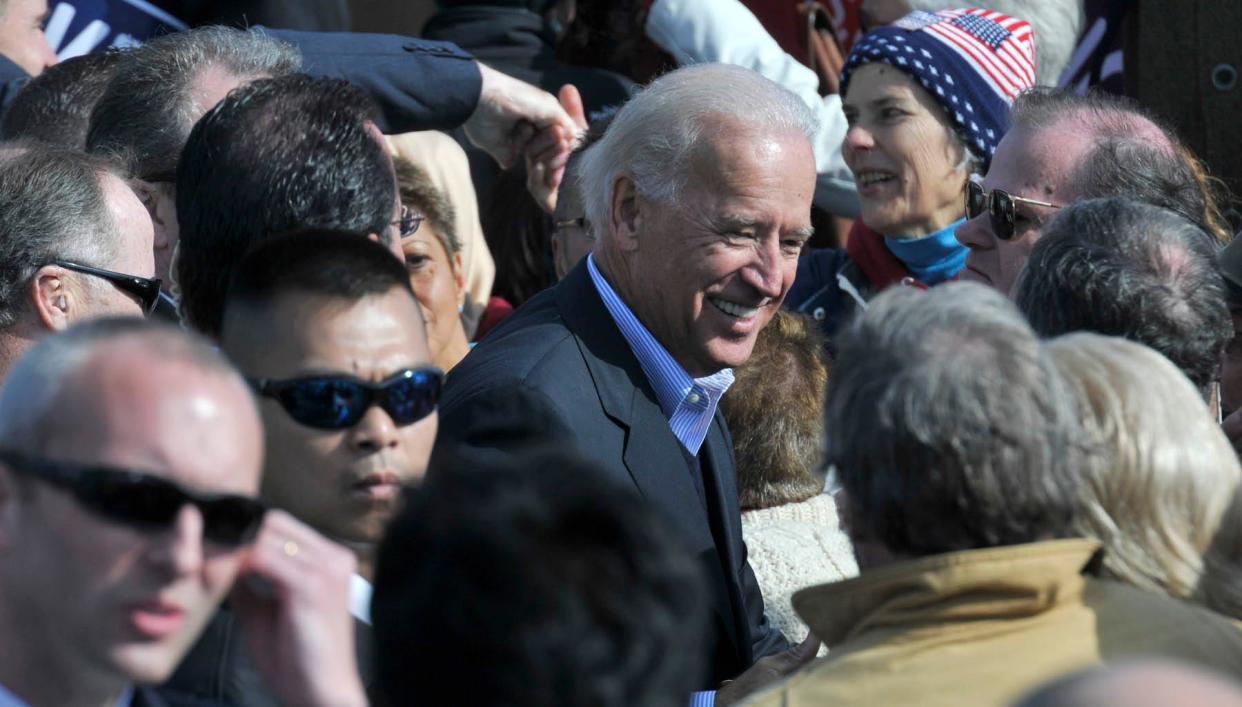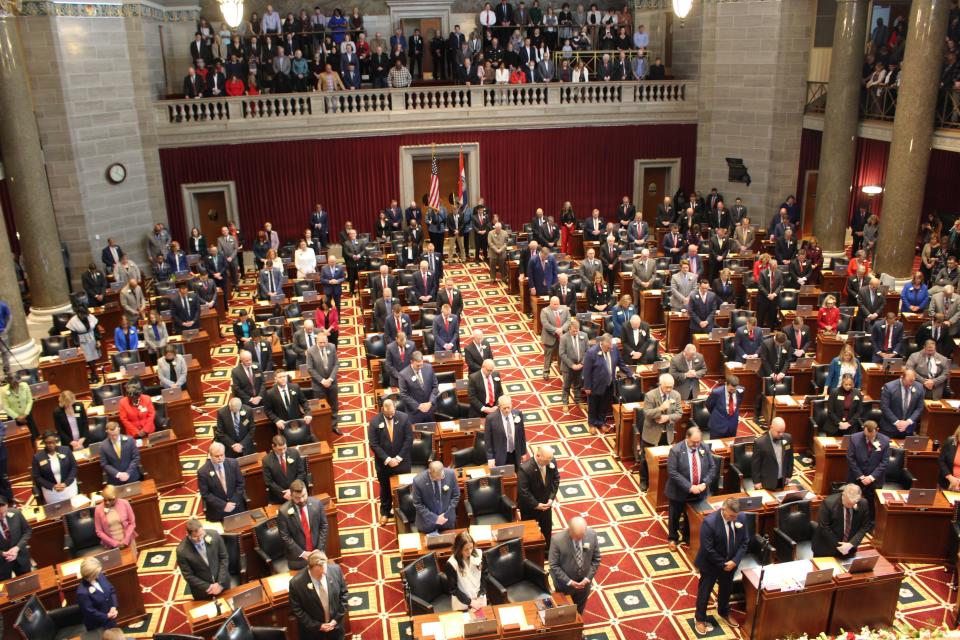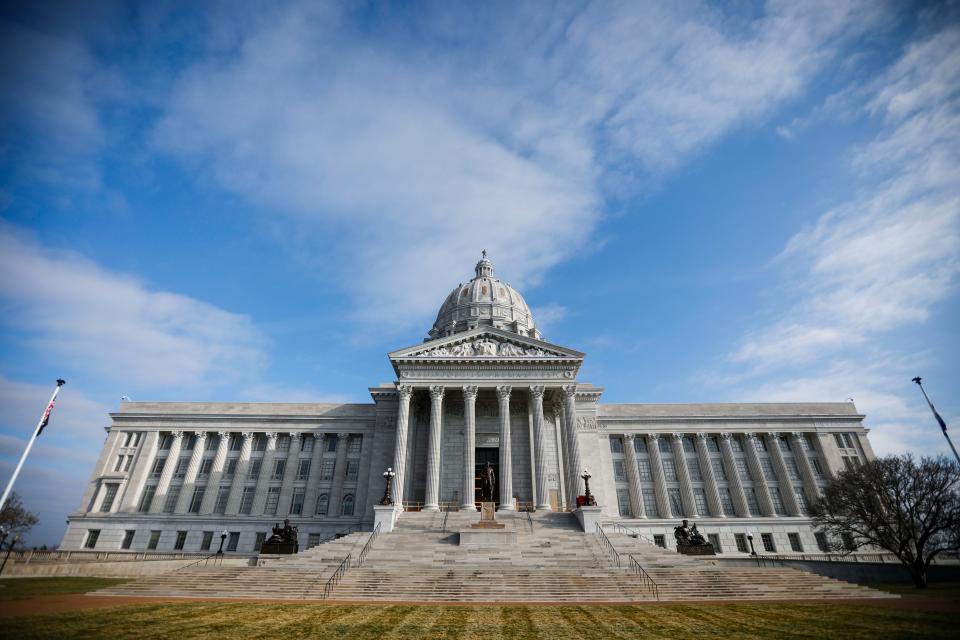Biden's decision to end run just another unprecedented campaign moment, MU prof says

- Oops!Something went wrong.Please try again later.
- Oops!Something went wrong.Please try again later.
While President Joe Biden stepping aside from his campaign and endorsing Vice President Kamala Harris, who as of Tuesday had enough delegates to secure the Democratic Party's nomination for president, is historic, it is just another moment in the country's relatively short political history, says Ben Warner, University of Missouri associate professor in the Department of Communication and co-director of the university's Political Communication Institute.
He reacted Monday to Biden's decision and its implications moving forward for the presidential race between former President Donald Trump and presumptive nominee Harris.
"We've had about as many presidential elections as we've had Super Bowls. I think we're at the 59th election and the 58th Super Bowl, and really only a dozen (elections) since the current primary process we use. It is historically unprecedented, but with the caveat anything unusual is going to be historically unprecedented," Warner said.
Biden's decision is reminiscent of one made by Lyndon B. Johnson in March 1968 to not seek reelection.
"This is later for sure, and 1968 was about as historically unprecedented a year as you can get, so when making comparisons, it is not a surprise that one would come up," Warner said.
While Biden's decision did not necessarily feel sudden, there was not an indication of when it would happen, he added. What was surprising was everything coalescing so quickly behind Harris in the similar manner the party coalesced behind Biden in 2020 after the Iowa and New Hampshire primaries.
"In an era of weak parties compared to strong parties, that a party does appear to organize not through some central force, but a shared understanding, that was really interesting to witness over the last day," Warner said.
The Democratic convention
Harris, as noted, on Tuesday had enough delegates pledged to her to clinch the party nomination when it convenes next month in Chicago.
This includes Missouri's 70 delegates, who Missouri Democratic Party Chair Russ Carnahan on Sunday said would likely put their support behind Harris after Biden's endorsement. The Missouri Democratic Party on Tuesday confirmed the support.
"The Missouri Democratic Party State Committee unanimously endorsed and all Missouri Biden Delegates endorsed Kamala Harris for President" during a Zoom call Monday night, the party said in a news release.
"We’d like to thank President Biden for listening to the American people and making this selfless decision to put America first. The conversation we will continue to have around our Democratic values as we nominate our candidate will only continue to generate excitement and enthusiasm and will re-engage voters," Carnahan said Tuesday in the release. "Vice President Kamala Harris is exactly the candidate we need at exactly the moment we need her to beat Donald Trump and his Project 2025 Agenda."
The decision sent a lightning bolt across the country and millions of dollars in small donations, he added.
Likely challengers to Harris also have endorsed her, Warner said. This includes Michigan Gov. Gretchen Whitmer; Illinois Gov. J.B. Pritzker; Pennsylvania Gov. Josh Shapiro, who is a possible running mate for Harris; U.S. Secretary of Transportation Pete Buttigieg; and Arizona Sen. Mark Kelly, who also is a running mate contender, among many others.
Warner thinks Harris may choose a running mate from either Blue Wall states of Michigan, Pennsylvania or Wisconsin or someone from the Sunbelt states, such as Florida, Georgia, North Carolina or Arizona.
"(Presidential) candidates take very seriously the consideration 'Could this person be president? Could this person run the country?'" he said about the running mate choice. "I think we'll see a lot of speculation about who might help win the election, but we don't know enough to know who (Harris) thinks would be a good president if something happens to her."
It is a good idea for Harris to choose someone who will provide some regional balance to the ticket, since she is from California, Warner said, so a Harris/California Gov. Gavin Newsom ticket is highly unlikely.
Political messaging surprises
The presidential election cycle until Sunday felt like it had not really gotten off the ground, Warner said. Trump likely is playing his previous playbook of putting advertising dollars to work closer to November.
"They seem to have the theory that late messaging moves the needle," Warner said, adding even before the first presidential debate between Biden and Trump, there already was hand wringing in the Democratic party about Biden. "The Biden campaign seemed lackluster and wasn't convincing a lot of verve and stamina. Over the summer it felt like (the campaigns were) taking the time to get going, apart from Trump's robust schedule of rallies he holds."
After Biden's announcement Sunday, there was what felt like a lot of organic enthusiasm for Harris. It was surprising for Warner that the Trump campaign had not yet picked its messaging direction after Biden's endorsement of Harris.
"It felt like during the (Republican national) convention that a lot of the speakers were already thinking, 'We might end up running against Harris,' and there was a lot of messaging on immigration and how (Harris) was Biden's immigration czar. It seemed like the campaign had picked a direction and yet in the first 24 hours since the shift was made, it hasn't felt like there is a consolidated message yet," Warner said, predicting messaging would solidify by the end of the week.
One message that possibly could persist is the age argument that Republicans had lobbed at Biden, who is 81, but now that he's dropped out could turn toward Trump, who is 78, Warner said, referencing staunch Biden supporter Bakari Sellers pivoting to saying Trump is now the oldest-nominated presidential candidate.
Sellers: Kamala Harris is running against the oldest nominee for president of the United States in American history… I mean, the man is nearly 80-years-old and so the question is, can he serve another four years? I'm not sure he can pic.twitter.com/Au6RaBX9eC
— Acyn (@Acyn) July 21, 2024
"That felt a little bit tongue-in-cheek to me, particularly someone who was such a strong defender of Biden's candidacy," Warner said. "It does make me wonder if that will be a salient line of attack for the Democratic ticket, given how defensive some members of the party had been about Biden's age, and if that is a potential weakness for the Trump ticket, given how vocal the Republican party had been about Biden's age."
Other arguments expressed — including by candidates for office in Missouri — since Sunday are that Biden should just go head and resign the presidency too; the support for Harris is less about party unity and more about finances; and the rallying behind Harris does not seem democratic for the "Party of Democracy." Warner responded to those.
Republicans may get some traction with the third argument, but still is skeptical of that message, he said.
"The argument would be more compelling if the percentage of Americans wanting Biden to step aside .... wasn't nearly 80%," Warner said. "It probably relies on a technicality that I would be surprised people bought, which is 'a lot of people voted for Biden in the primary,' but it wasn't a competitive primary. There aren't a lot of people out there thinking, 'Hey, my vote is being ignored.'"
The finances versus enthusiasm argument could make sense, but Warner is not sure it's a damaging enough line of attack.
While people may feel like Biden should just resign, which would give the remaining six months or so of the presidency to Harris, Biden probably still feels like he ought to be able to run for president, but after hearing from other people in the party decided "OK, if I have to, then I have to (end my campaign)," Warner said.
"I would bet based on his and Harris' public statements is that they would say, 'He's still effective in his job and he has handled the job well,'" he said. "I don't see any downside to Republicans making these arguments, but I think they'll find meatier criticisms of Harris based on her own candidacy and they'll go after her on the issues they wanted to go after Biden on."
More: Here's how Missouri candidates reacted after Biden ended presidential campaign
Abortion rights a key issue
While a Missouri ballot measure on abortion rights has overwhelming support and a petition with more than 380,000 signatures was delivered to the Secretary of State's office, it still is not listed as a certified ballot question for November. There is every expectation it will be on the ballot, Carnahan expressed.
"Missouri has one of the most extreme, near-total abortion bans in the country, which cruelly does not make exceptions in cases of rape or incest, and overturning this ban will be on the Ballot in November," he said. "Republican politicians reaffirmed their commitment to their extremism and cruelty this legislative session by blocking a Democratic amendment to Missouri’s near- total abortion ban that would have carved out exceptions for cases of rape and incest. Every Republican voted against this amendment."
This means Democrats are "positioned to present a strong case to Missouri voters about what is at stake this election and highlight our solutions to address the critical issues facing our communities," Carnahan said. Warner generally agreed.
"Abortion is a strong issue for Democrats and Harris has always been the stronger messenger on the Democratic ticket. It was a weak issue for Biden and particularly strong for Harris. It is something the (Harris) ticket will want to make more salient," he said.
Trump's selection of J.D. Vance as his running mate, also could help abortion rights causes, because of the positions Vance has taken against them, Warner said. The Harris campaign is likely to focus on Vance's conservative positions on abortion, he added.
"(Abortion rights) is a winner for Democrats if it is what voters have in mind when they go to the ballot box all over the country. It is unclear whether that will be top of mind for voters. That is why I would expect Democrats to do everything to make it top of mind," Warner said.
More: Columbia business leaders endorse city's sales tax renewal proposal
Missouri election, legislative session expectations
Missouri's main legislative session starts in January, but before that are two elections: the Aug. 6 primary and the Nov. 5 general election.
Since there are a variety of contested races for state level positions for the primary it is harder to predict results than in November, said Peverill Squire, professor of political science and Hicks and Martha Griffiths Chair in American Political Institutions at MU.
"We have what appears to be a competitive three way race for governor (among Republicans). A very nasty race for attorney general and other races where you have multiple candidates. It's always hard to predict who is going to show up in early August for a primary election," he said.

In November, Republicans still are heavily favored to win their respective contests, which will not change the makeup of the General Assembly all that much, Squire said.
The one likely change is Missouri Senate District 19 in Boone County. The seat is favored to switch from Republican to Democrat with Stephen Webber. Redistricting shrunk the size of the District 19 to include just Boone County, rather than Boone and part of Cooper County.
Republican Chuck Basye also had sought the Senate District 19 seat but withdrew after a cancer diagnosis. The Republican party then installed James Coyne as the candidate, who as of July 15 has not raised or expended at least $500 in the campaign compared to Webber raising more than $500,000 this election cycle.
"That will give Democrats a little bit more say in the Missouri Senate, but not a lot," Squire said.
House District seats — in Boone County at least — likely will stay the way they are now, he added. So, House Districts 45, 46, 47 and 50 will remain in Democratic control, while District 44 covering eastern Boone County will remain Republican after November.

A ballot measure on abortion rights likely on the November ballot and the now likely Harris presidential ticket, could also marginally help Democrats for November voter turnout, Squire said.
"That will probably energize a number of particularly younger people who would lean toward the Democrats to show up," he said.
Also if the abortion question ends up on the November ballot, that could take the wind out of Republican sails for making changes to the state's initiative petition requirements, Squire said. Legislative session infighting in the Republican party, including from those wanting to push the party further to the right ideologically, depends on how the election turns out, he added.
"It may depend on who wins the governorship. There may be a little grace period for a new Republican governor that some Republicans may be reluctant to cause too much trouble. That remains to be seen. There still are some difficult personalities in the body and leadership will have to contend with them," Squire said.
It's too early to tell what bills will make it through the next legislative session, but the main thing for lawmakers will be the state's budget, Squire said. It's going to be harder to craft the state's budget this next session, he said.
"The state is still in good financial condition, but that is changing. It's become a little more challenging than it has in the past," Squire said. "... A lot of the money the federal government pumped into states in response to COVID-19 is beginning to fade away and states have committed most of it. The state's revenues are running OK, but not particularly well. The state has voted to reduce tax rates and assuming they meet their revenue targets, that will reduce the amount of revenue that comes in."
Increasing costs and revenues staying stable or going down puts pressure on decisionmakers, and tougher decisions will be needed to live up to recent things that have been done, he added.
"(This is) covering transportation costs or helping schools meet the higher minimum pay for teachers. All that will be harder for them to follow through on if the budget doesn't improve dramatically in the next couple of months," Squire said.
Charles Dunlap covers local government, community stories and other general subjects for the Tribune. You can reach him at cdunlap@columbiatribune.com or @CD_CDT on X, formerly Twitter. Subscribe to support vital local journalism.
This article originally appeared on Columbia Daily Tribune: MU professor assesses Joe Biden's decision to end reelection campaign

